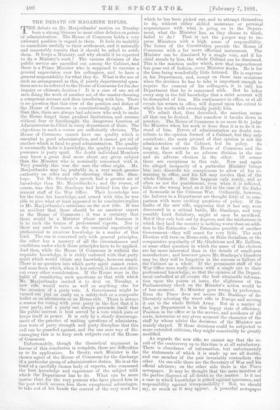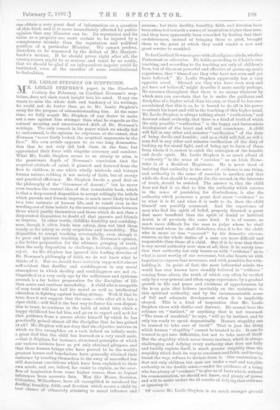THE DEBATE ON MAGAZINE RIFLES.
THE debate on Mr. Marjoribanks' motion on Tuesday bore a strong likeness to most other debates on points of administration. The Houso of Commons holds a very awkward position in regard to them. It feels its inability to contribute usefully to their settlement, and it naturally and reasonably resents that it should be asked to settle them. It keeps a Ministry, and why should it be expected to de a Ministry's work ? The various divisions of the public service are parcelled out among the Cabinet, and there is a Prime Minister who is supposed to exercise a general supervision over his colleagues, and to have a general responsibility for what they do. What is the use of such an. arrangement as this, if purely departmental ques- tions are to be referred to the House of Commons for fin her inquiry or ultimate decision ? It is a case of one set of men doing the work of another set, of the master choosing a competent servant and then interfering with him. There is no question that this view of the position and duties of the House of Commons is constitutionally right. More than this, there are always bad. advisers who seek to make the Houso forget these prudent limitations, and assume without fear or forethought the dangerous function of Administrator-in-Chief in every department of State. The objections to such a course are sufficiently obvious. The House of Commons cannot have one quality which is essential to good administration, and it cannot get rid of another which is fatal to good administration. The quality it necessarily lacks is knowledge, the quality it necessarily possesses is party spirit. No doubt individual Members may know a great deal more about any given subject than the Minister who is nominally concerned with it. Very possibly this was the case the other night. Mr. Marjoribanks may be, probably is, a very much greater authority on rifles and rifle-shooting than Mr. Stan- hope. Yet Mr. Stanhope's speech had a greater air of knowledge than Mr. llajoribanks's ; and the reason, of course, was that Mr. Stanhope had behind him the per- manent staff of the War Office. Their knowledge was for the time his knowledge, and armed with this, he was able to give what at least appeared to be conclusive replies to Mr. Marjoribanks's criticisms on the new rifle. It was an accident that. there should be an amateur expert in the House of Commons ; it was a certainty that there would be a Minister whose special business it is to suck the brains of professional experts. Nor is there any need to insist on the essential superiority of professional to amateur knowledge in a matter of this kind. The one is concerned only with general principles, the other has a mastery of all the circumstances and conditions under which those principles have to be applied. And then, while the House of Commons-is without the requisite knowledge, it is richly endowed with that party spirit which would vitiate any knowledge, however ample. There is no question into which party spirit cannot enter, and none from which, when it has entered, it does not drive out every other consideration. If the House were in the habit of considering such questions as that with which Mr. Marjoribanks invited it to deal on Tuesday, a new rifle would serve as well as anything else for the occasion of a party vote. A Government might be turned out just as easily on a safety-bolt or a composite bullet as on allotments-or on Home rule. There is always a reason for voting with your party in the fact that it is your party, and a party can always persuade itself that the public interest is best served by a vote which puts or keeps itself in power. It is only by a steady discourage- ment of the practice of making questions of administra- tion tests of party strength and party discipline that this evil can be guarded against, and the one sure way of dis- couraging this is to keep such subjects out of the House of Commons.
Unfortunately, though the theoretical argument in favour of this conclusion is complete, there are difficulties as to its application. In theory, each Minister is the chosen agent of the House of Commons for the discharge of a particular group of administrative duties. He is at the head of a carefully chosen body of experts, who command the best knowledge and experience of the subject with which the Department has to do. What can be more unwise than for the very persons who have placed him in the post which secures him these exceptional advantages, to take out of his hands the control of the very work for which he has been picked out, and to attempt themselves to do, without either skilled assistance or personal acquaintance with what is going on in the Depart- ment, what the Minister has, as they choose to think, failed to do ? That is not the p roper way to im- press Ministers with a high sense of responsibility. The forms of the Constitution provide the House of Commons with a far more effectual instrument. The Minister can be dismissed by a single vote, and if his chief stands by him, the whole Cabinet can be dismissed. This is the sanction under which, uow that impeachment has gone out of fashion, every Minister works. He is for the time being wonderfully little fettered. He is supreme in his Department, and, except on those rare occasions when the decision he has to take is important enough to require the consent of his colleagues, it is only his Department that he is concerned with. But he takes every step in the full knowledge that a strict account will be demanded of him. His continuance in office, or at all events his return to office, will depend upon the extent to which his works will eventually justify him. We admit that, thus described, the sanction seems all that can be desired. But somehow it breaks down in practice. The House of Commons is no more fit to judge the Minister when his work is done than it is to do it in- stead of him. Errors of administration no doubt con- tribute to the opinion formed of a Cabinet, but they only contribute ; the main ground of that opinion is not the administration of the Cabinet, but its policy. So long as that contents the House of Commons and the country, there will be no adverse division in the one and no adverse election in the other. Of course there are exceptions to this rule. Now and again the alleged incapacity of a particular Minieter brings him into discredit too conspicuous to allow of his re- maining in office, and his fall may involve that of the whole Cabinet. But this happens only rarely, and as often as not the punishment, even when it is inflicted, falls on the wrong head, as it did in the case of the Duke of Newcastle in the Crimean War. Ordinarily, however, the failures in a Department are thought little of in com- parison with more exciting questions of policy. If the faults of the new rifle, supposing that it has any, were discovered in a critical battle, Mr. Stanhope, and very possibly Lord Salisbury, might at once be sacrificed. But if they only leak out by degrees, and the misfortune in which they land the country is nothing worse than an addi- tion to the Estimates—the Estimates possibly of another Government—they will count for very little. The next Election will turn on Home-rule, or State Socialism, or the comparative popularity of Mr. Gladstone and Mr. Balfour, or some other question in which the mass of the electors are far more interested than in the details of small-arm manufacture ; and however grave Mr. Stanhope's blunders may be, they will be forgotten in the success or failure of the Cabinet as a whole. If the permanent staff of the War Office were really chosen with a single eye to their professional knowledge, so that the opinion of the Depart- ment embodied at all events the best attainable informa- tion upon the points at issue, the slightness of the Parliamentary check on the Minister's action would be of less moment. No Minister goes wrong by preference. Even the Times does not accuse .Mr. Stanhope of de- liberately selecting the worst rifle in Europe and serving it out to the whole British Army. But as a matter of fact, no Department is in this happy state of efficiency. Position in the office or in the service, and accidents of all sorts, determine at any given moment the character of the staff by whose advice the decisions of the Minister are mainly shaped. If those decisions could be subjected to more extended criticism, they might conceivably be greatly modified.
As regards the new rifle, we cannot say that the re- stilt of the controversy up to this time is at all satisfactory. There is abundance of information, but unfortunately the statements of which it is made up are all double, and one member of the pair invariably contradicts the other. On one side there are the Secretary of War and his official advisers ; on the other side there is the Times newspaper. It may be thought that the mere mention of the parties disposes of all doubt in the matter. Is it not a case in which knowledge is pitted. against ignorance, and responsibility against irresponsibility ? Not, we should say, so much as it may appear. A powerful newspaper can obtain a very great deal of information on a question of this kind, and it is more immediately affected by public opinion than any Minister can be. Its reputation and its value as a property are more certain to be injured by a conspicuous mistake than the reputation and political position of a particular Minister. We cannot profess, therefore, to be reassured by the defeat of Mr. Marjori- banks's motion. If he should prove right after all, the consequences might be so serious and must be so costly, that we should be glad if an independent inquiry could be instituted, even at the sacrifice of some constitutional technicalities.











































 Previous page
Previous page